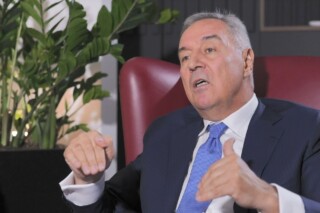At the session held on Thursday, the government drew up the Draft Law on 2015 Budget of Montenegro Final Accounts.
“The total budget revenues for 2015 were €2,167,340,000, while total expenditure amounted to €2,159,690,000. The public debt amounted to 63.33% of GDP”, the government said.
Commenting on the Draft Law on 2015 Budget Final Accounts, Lazovic said that we needed to create more in order to ensure a dynamic growth.
During the discussion, it was emphasised that the government’s primary fiscal policy objective was to reduce current spending and increase investment in infrastructure, in order for the public debt to be funded from economic growth and for establishing its downward trend.

“By increasing budget revenues through efforts to fight the gray economy and strengthening fiscal discipline, we tried to reduce the deficit of public finances, using at the same time the mechanisms for rationalising consumption. Tax exemptions and support to capital and development projects strengthened the development component of fiscal policy, in order to take into account the need to finance projects that will provide economic growth in the long run”, the government assessed.
The government also adopted the Information on possible solutions to the outstanding issues in the field of energy in the context of the Berlin process and adopted the conclusions according to which the competent institutions are obliged to take steps to establish a power exchange in Montenegro.
Discussing the issue, the ministers of interior and labour and social welfare, Goran Danilovic and Boris Maric, requested additional explanations regarding the estimates contained in the material regarding the advantages and disadvantages of forming the Montenegrin power exchange or joining one of the existing power exchanges in the region.

Danilovic expressed doubts about certain estimates contained in the material.
Deputy prime minister Vujica Lazovic said that the energy policy of Montenegro defined strategic directions and one of them is to turn Montenegro into a regional energy hub. One of the conditions to achieve that is forming its own power exchange, he explained.
Within the discussion on staff issues, the government unanimously adopted the proposals for the engagement of the opposition representatives in the centres for social welfare and management bodies of companies at the local level, as well as in local government bodies in charge of finance in the municipalities of Berane and Rozaje. Thus, the implementation of the agreement on free and fair elections was continued.

On this occasion, deputy prime minister Dusko Markovic called on all the members to show the highest degree of tolerance in the initial phase of the work of the government of electoral trust. He said that any compulsion in the political evaluations and qualifications may harm the joint project and compromise it in the eyes of those entities who, from a political standpoint, want this project to fail.




